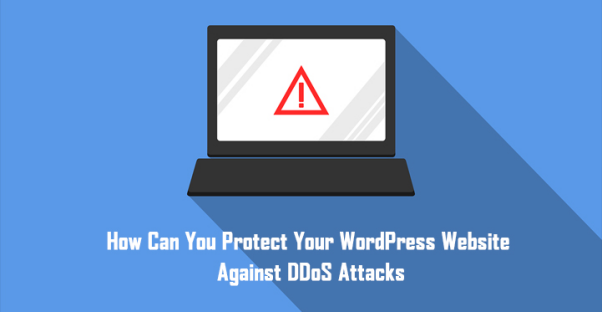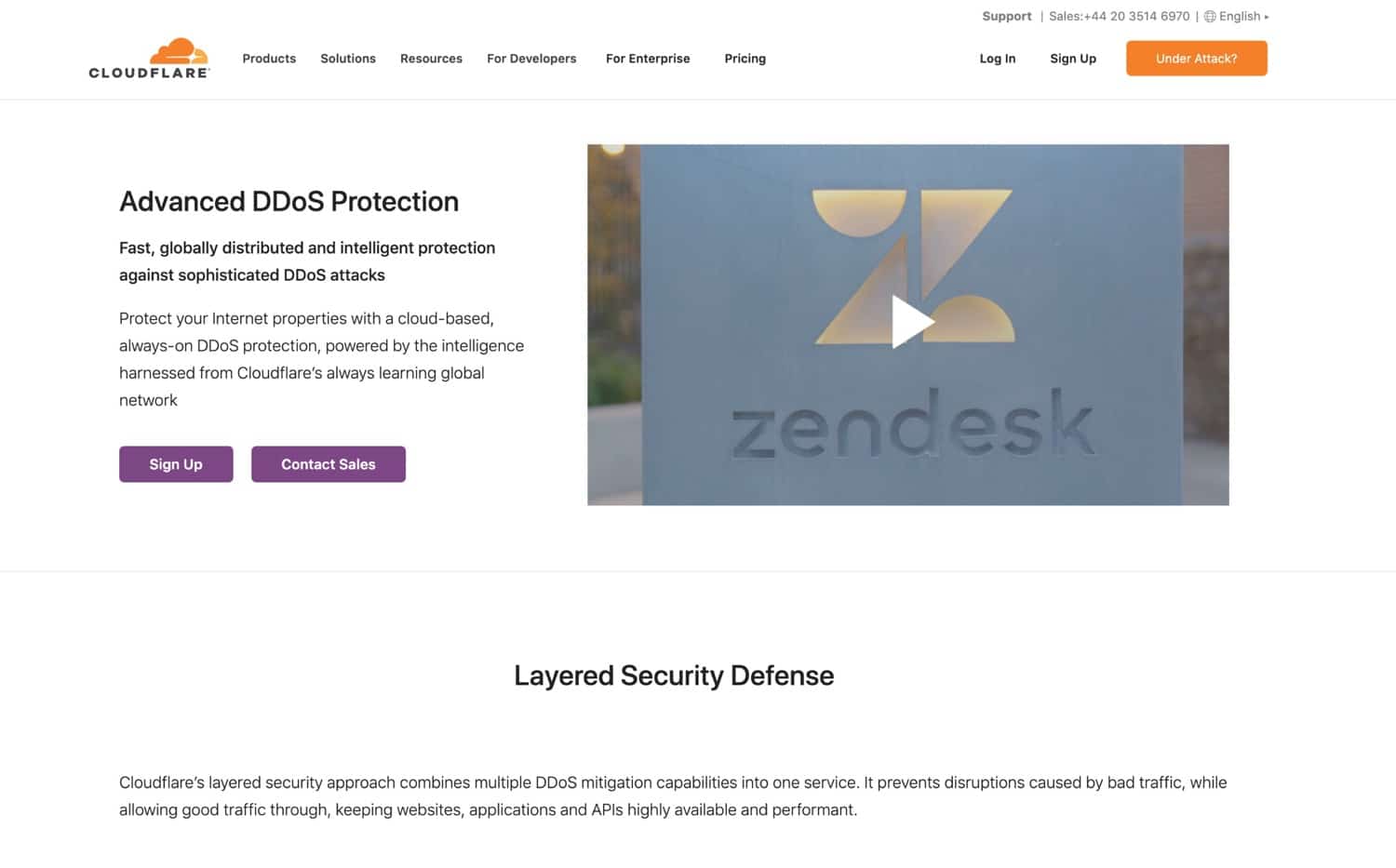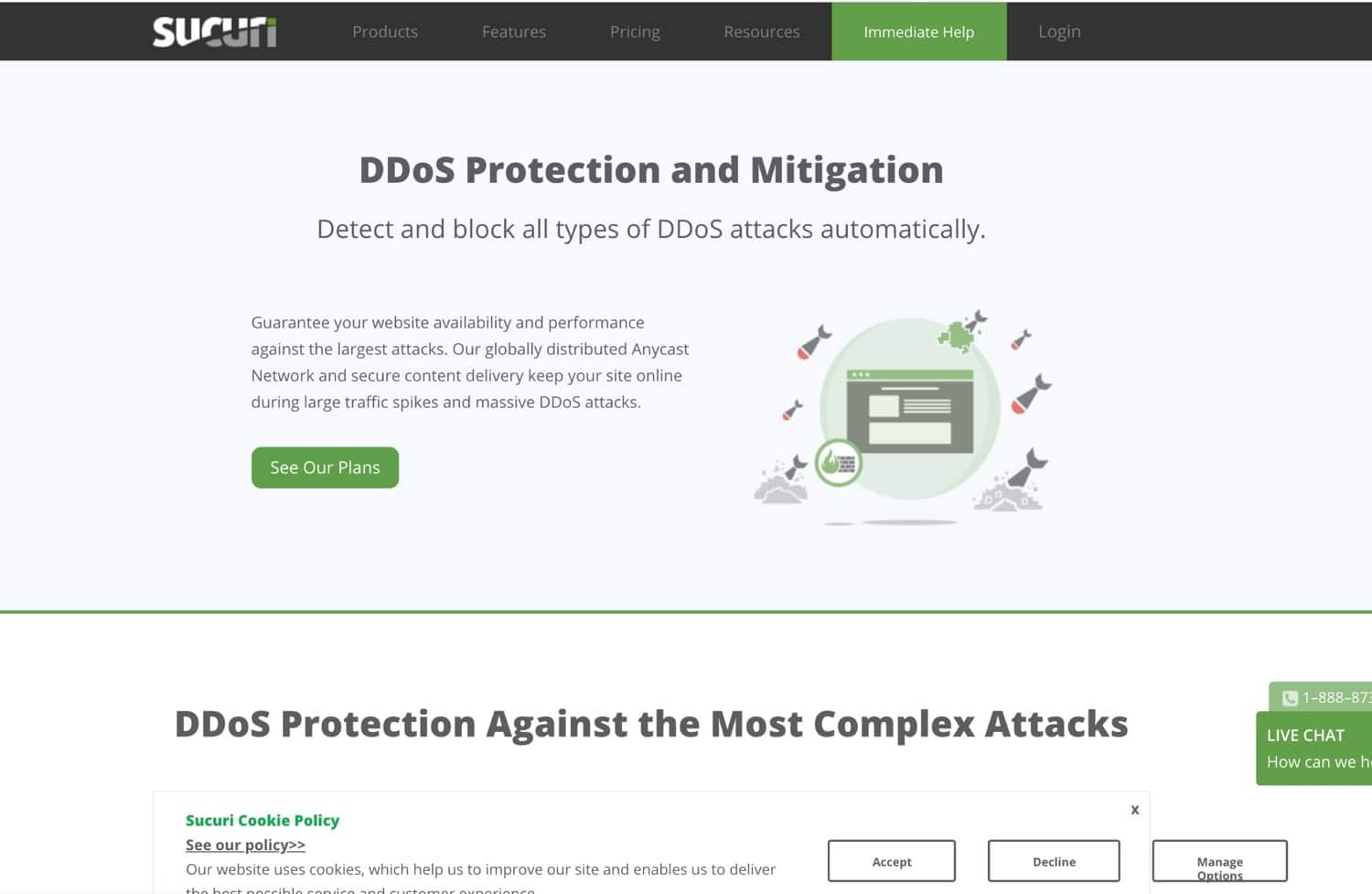DDoS (distributed denial of service) attacks are one of the most popular and hardest to deter hacking attacks known.
Table of Contents
In a distributed denial of service attack, a server is flooded with so many connection requests that it buckles and goes down because it doesn’t have the bandwidth to support all the connection requests.
This is similar to what happens to a website when it goes viral and is flooded with traffic until it goes down, only in this case, the traffic isn’t legitimate viewers.
The whole purpose of a DDoS attack is to take the website down and disrupt its ability to support legitimate web traffic, as well as incur high bandwidth fees and possible disruption of service for the website owner.
You may wonder, who would want to do that to my website? Why would they want to do that to my website? The answer is that it could be anyone that doesn’t like you, disagrees with the content of your website, or even just in general feels like causing chaos.
Good web hosts already take security measures to help protect you from these types of attacks. You can find out who the best web hosting is by browsing through the expert and user reviews and ratings.
But, even the most secure web host can’t provide complete protection for your website. The rest is up to you.
Steps to Protect Your WordPress Website Against DDoS Attacks
1. Virtual Private Networks
A virtual private network (VPN) is an encrypted server you can connect your website to. Its entire purpose is to mask the origin of your website’s server, which makes it much more difficult to target your website in a DDoS attack.
VPNs were originally used by businesses and private users to connect to the internet safely, but nowadays they can be utilized by websites as well for an extra measure of protection.
Another major way in which a VPN can help protect you is encrypting your web traffic between you and your website if you use it on your personal PC.
This makes it much harder for a hacker to use sniffing tools (tools designed to intercept and access the information passed between you and the internet) to find out your login credentials and hijack your website.
2. Plugins
If you’re using WordPress, there is great news for you. WordPress already has several plugins to help you protect yourself against a DDoS attack.
Loginizer limits the amount of times someone can try logging into an account before their IP address gets blocked from your website, which is helpful in preventing brute force attempts as well as attempts to flood and confuse your server with login traffic.
The Wordfence and Bulletproof Security plugins assist further by blocking traffic that is demanding too many connection requests at once, as well as setting up blacklists of bad IP address ranges that have been found to have malicious intent.
However, plugins shouldn’t be your only choice for protecting your website from DDoS attacks. Many plugins go neglected by their developers and lack up to date security measures to keep your website safe.
You should make sure you are only using plugins that are up to date, have numerous good reviews, and are well trusted within the WordPress community.
3. Surveillance
None of the security tools in the world can replace your own eyes. In the case that a DDoS attack slips through, you may notice that your pages are loading slowly and have time to block the bad IP address ranges before your website goes completely down.
Check your website out every day by doing a scan through the main pages. If you notice anything out of place, go ahead and assume that something is wrong and take measures to block any suspicious traffic. The same goes for your page views and other web performance statistics.
If these suddenly drop for apparently no reason, don’t just assume it’s a bad day. Investigate further to see if you’re a victim of an attack.
Again, make sure that your web host is a good web host that takes security measures to help protect your website against DDoS attacks, as well. If they don’t, or if you notice you keep getting DDoS attacks, it may be time to switch web hosting providers.
4. Don’t Go Looking For Trouble
You have every right to defend yourself and your website online, but first ask yourself if the fight is really worth the battle.
You never know if the person you get in a dispute with online is a hacker or has hacker friends, and hackers love to have any excuse to attack a website. A DDoS attack may be the least of your concerns if you manage to piss a hacker (or hacker’s friend) off.
So don’t fall for flamebait or trolls. Ask yourself if you’ve got better things to do. Responding to verbal attacks or disagreeable opinions online could just be the fuel that starts a fire you don’t want to have to put out.
Additionally, show good web etiquette and only post your website’s URL where it is welcomed. Don’t advertise or spam other websites with your URL if they are not designed for advertising.
5. Cloud Distribution Networks
Cloud distribution networks (CDN) can give you an extra layer of security by handling your web traffic load for you.
These networks spread your web traffic among multiple servers so that in case your website gets a DDoS attack, the traffic gets spread out among their servers and doesn’t take your website down.
Additionally, they include security measures such as encryption, connection request limits, and CAPTCHAs to prevent DDoS attacks from happening in the first place.
CloudFlare offers their basic tier of service for free, and walks you through the entire setup step by step.
Additionally, don’t assume that just a little bandwidth above your current web traffic load is everything you need. Make sure you have plenty of bandwidth to handle a sudden spike in traffic so if your website goes viral it won’t buckle under the load.
Doing this will also make it harder for hackers to take your website down in a DDoS attack, since it will take a lot more traffic than normal to take your website down.
6. Have A Plan
Make sure you have a contingency plan in the event that a DDoS attack takes place. A very simple plan looks something like this:
– Check the traffic flow to determine just how much traffic you have to handle during the DDoS attack.
– Start using any tools or technologies you have access to that can help you handle the DDoS attack’s traffic load.
– Try to identify the originating IP addresses/IP address ranges and, if so, block them from accessing your website.
– Temporarily change your IP address with your web hosting provider’s help to throw the attackers off the trail for a bit.
– Contact your web hosting provider to see if there’s anything additional they can do to help you.
– If everything else fails, shut down your website. This will make the attacker’s efforts useless and they may move on faster.
– After the situation has passed, analyze your website’s security and see if there’s anything more you can do to prevent future attacks.
7. Why are DDoS Attacks So Bad?
Ultimately, DDoS attacks are so disastrous because they can lower your readership by causing your viewers to lose faith in your website’s stability.
Dead air is just as disastrous for a website as it is a TV or radio station. So, you want to make every preparation you can ahead of time to prevent a DDoS attack from ever being a problem.
Now is the time to take action. Check your website and see what plugins or tools you can install to help you in the event of a DDoS attack.
Check every corner of your website and administrative tools and make sure you are familiar with all of it. Teach yourself more on how DDoS attacks work, and create a contingency plan today that will help you know what to do should your website be victimized in a DDoS attack.
How to Protect Your Site Against DDoS Attacks?
Protection from Your Hosting Provider
A secure firewall with integrated DDoS protection is included for Cloudflare integration sites. Using stringent software-based controls can further safeguard your website.
By turning on the IP Geolocation blocking function, you may securely prevent IP addresses from the geographic area from which an attack is originating from sending requests to your website.
Most web hosting companies include CDNs in their hosting packages to reduce DDoS attacks. An Information Distribution Network (CDN) technology, which is a collection of servers in several places that store cached content and distribute it rapidly to website users, is used by web hosts.
DDoS assaults are less likely to disrupt service due to the reduction of hosting capacity by the cached content. The majority of hosting companies offer effective firewalls, which lessen but do not completely eliminate the possibility of an attack.
They will also have resources available to you or them, such as IP blocking, to halt the DDoS assault once it has begun.
However, DDoS assaults cannot be completely prevented, but they may be made less likely, and their effects can be reduced.
To make this happen, you should utilize a large network that can use its database on attacks on other websites all over the world to predict attacks and block IPs from potential threats. This will allow you to fully protect yourself against DDoS attacks.
Cloudflare
Increasing the performance and security of websites and services is one of the reasons why people choose Cloudflare’s services. Additionally, Cloudflare offers protection by shielding websites from undesirable intrusions such as DDoS assaults, malware bots, and other malicious activities.
Even if a website or app’s content is encrypted, your Internet provider and anybody else keeping tabs on Internet traffic may still see everything you do online.
On any device, you may utilize Cloudflare’s free DNS service, 1.1.1.1. Your data is shielded from analysis and ad targeting thanks to Cloudflare’s 1.1.1.1. Due to its scale, it can identify the IP addresses of the origin of DDoS attacks and block them for all the websites on its network.
The cloud-based network of Cloudflare is continuously active and always improving. This allows it to constantly detect possible attacks and block unauthorized traffic from entering your website.
Additionally, it gives you access to a dashboard for monitoring and preventing DDoS assaults, allowing you to determine any potential weaknesses.
Using its Autonomous Edge, Cloudflare uses automated detection and mitigation to stop DDoS assaults. Numerous dynamic mitigation rules are presented as controlled rulesets by Cloudflare DDoS Attack Protection on the Autonomous Edge.
The Autonomous Edge and centralized DDoS systems of Cloudflare evaluate traffic samples “out-of-path,” enabling asynchronous detection of DDoS assaults without introducing delay or affecting performance.
In the event that attack traffic complies with a rule, Cloudflare’s systems will monitor that traffic and produce a real-time signature to precisely match against the attack pattern.
It then neutralizes the assault without affecting genuine traffic. The rules can produce distinct signatures depending on the characteristics of the assaults and the signal strength of each parameter.
SUCURI
Sucuri is a website-managed security solution provider. The cloud-based technologies offer a comprehensive solution for website security.
It incorporates CDN speed optimization, external attack mitigation, including protection against vulnerability exploits and DDoS assaults, and expert response in the case of a security incident.
Sucuri will keep an eye on your website for outages, attacks, and hacks and take care of any issues that arise. Being with Sucuri ensures that you can restore your WordPress site as soon as possible if you experience a DDoS assault and it is compromised while it is vulnerable.
All application and network attacks are detected and stopped by Sucuri’s DDoS mitigation and prevention service. Attack data is connected to foresee bad conduct and shield you from potential threats.
During widespread attacks, it keeps your website up and greatly reduces requests from fraudulent sources. They automatically prevent hostile bots and hackers when they are found to be attacking the website. Sucuri uses a monitoring platform for websites called a cloud-based compromise detection system (CDS).
The monitoring scanners regularly scan your website and notify you if they find anything questionable. This enables you to act fast and minimize any adverse effects on your traffic.
Additionally, Sucuri provides an Intrusion Detection System (IDS) on the firewall, which was created to guard against DDoS assaults.



